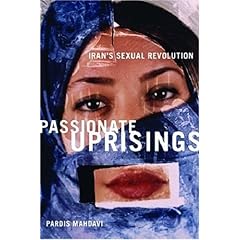A few years ago, in the course of researching her dissertation on changing sexual mores in the Islamic Republic of Iran, a young Iranian-American anthropologist named Pardis Mahdavi stopped by the Ministry of Education in Tehran to inquire about the country's sex education curriculum. Another visitor happened to be there. An older woman named Mrs. Erami, she was covered head to toe in the most conservative form of Iranian hijab: the tentlike black chador, held in place by the wearer's teeth such that it obscures half the face. Under her chador, Mrs. Erami wore another voluminous layer of hijab, including a hoodlike head scarf and a long, loose coat. Hers was the uniform of the government faithful, the traditional-minded and the sexually puritanical--the very image of the older generation that Mahdavi's main research subjects, Tehrani youth, rebuffed with their outsized vanity and sexual libertinism.
But Mrs. Erami had come to the ministry on a mission related to Mahdavi's. She taught courses on health, puberty and relationships at a Tehran high school, and she had come to talk to the minister about her frustration with her students' unwillingness to discuss sexual matters frankly with her. In a country where premarital sex with multiple partners is increasingly common but remains culturally taboo and punishable under the law, this severe-looking, chador-clad woman was, at a glance, hardly the person in whom one might feel comfortable confiding one's illicit activities or seeking intimate advice. Mahdavi didn't even feel comfortable letting the older woman see her nail polish, which is illegal but commonplace in Iran. Nonetheless, Mrs. Erami could not understand her students' reticence. "They are so difficult," she told Mahdavi. "I can't get them to talk to me, but I know what they are doing and what they are not doing. I had a teenage daughter myself, and I know that they are having a lot of sex, but not doing it right. I just can't get them to talk to me about it."
Mrs. Erami, it turns out, is one of the more dramatic products of the generational upheaval in Iranian attitudes toward sex. A conservative Muslim, she was not sympathetic, some years before her encounter with Mahdavi, when her gay son came out of the closet. Her husband threw him out of the house. When their unmarried daughter announced that she had a boyfriend, Mrs. Erami slapped her and called her a prostitute. The daughter left home that day, never to return. And so the Eramis lost both of their children over their unwillingness to accept sexual behavior that had become the norm not only globally but even within many circles inside Iran. A year later Mrs. Erami's husband died, leaving his wife entirely alone and flooded with regret. That was when she devoted herself to sex education reform, both as a teacher and as a campaigner within Iran's education ministry.

cover of the book Passionate Uprisings (Amazon.com)
I love irony. Repress people's human nature and they will try to express it in an extreme manner.
*****************
Emily didn't come around for dinner last night, so I had baked beans on toast.
No comments:
Post a Comment